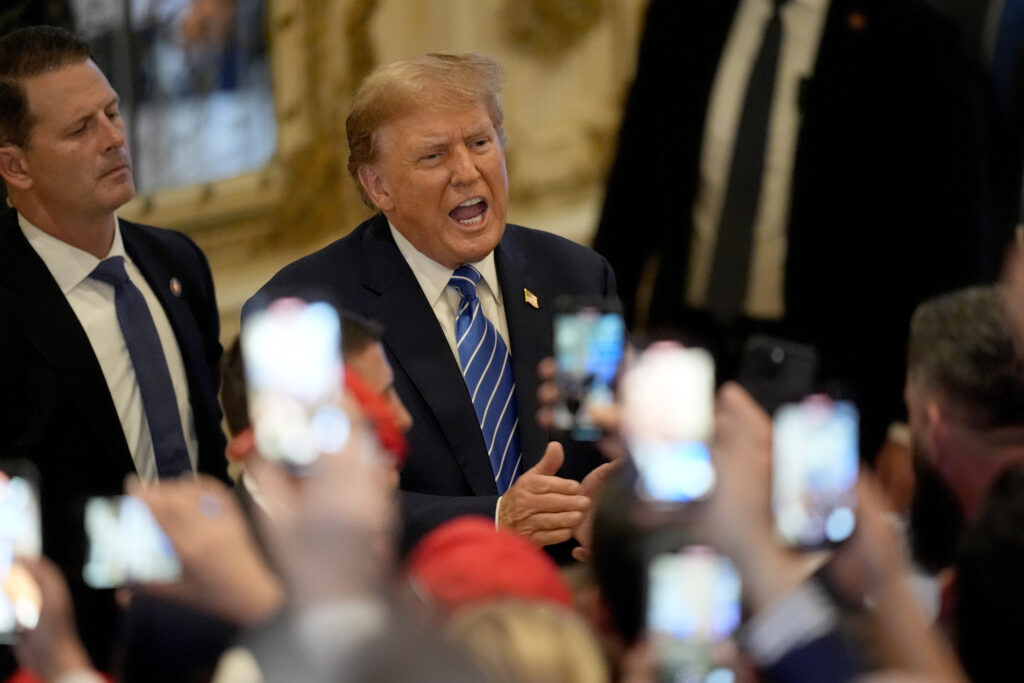Republicans are about to take a leap of faith. Their presumptive nominee is familiar. This will be the third consecutive election in which former President Donald Trump is their standard-bearer in the race for the White House. But the situation is unprecedented.
Trump faces 91 criminal counts across four cases in multiple jurisdictions. He is facing civil judgments that threaten his vast business empire and personal fortune. Nevertheless, Trump is seeking to become only the second president elected to nonconsecutive terms (the first being Grover Cleveland) and also the second to take office older than Ronald Reagan when he left (the first being Joe Biden, the incumbent).
While facing unprecedented legal headwinds, Trump remains weighed down by the same baggage that plagued his last two presidential campaigns. He is broadly unpopular, especially among college-educated suburban voters and women. His unfavorable rating is 54.1%, according to a RealClearPolitics polling average, compared to 42.1% who view him favorably. Trump never had a higher job approval rating than 49% during his term, not even during periods of relative peace and prosperity.

There are millions of voters who don’t like the way Trump talks, the way he posts or uses social media, the way personal vendettas affect or distract from his governance. Many of these voters reside in the Republican Party, including its congressional leadership teams.
ELECTION 2024: FOLLOW LATEST COVERAGE
Moreover, Trump has presided over previous electoral setbacks for his party. Republicans lost control of the House during the midterm elections in 2018. They lost the White House and Senate during his reelection bid in 2020, capped by a pair of runoff election defeats in Georgia as Trump went around complaining the presidential race was rigged against him, claims that are at the center of one federal criminal case and a second in Fulton County, Georgia. His endorsed candidates contributed to the GOP’s underperformance in the 2022 midterm elections. Trump lost the popular vote in his successful 2016 campaign, becoming only the second president to do so since 1888.
The Biden campaign greeted Trump’s impending nomination with glee. “Donald Trump limps into the general election as a wounded, dangerous and unpopular candidate,” Biden campaign chairwoman Jen O’Malley Dillon and campaign manager Julie Chavez Rodriguez wrote in a memo the morning after Super Tuesday. “The Republican nominee is cash-strapped, beleaguered by a host of external issues, and is running on an extreme agenda that is already proving to be a significant liability for key voting blocs that are critical to the pathway to 270 electoral votes.”
“On the metrics that matter, Team Biden-Harris is roaring into the general election on firm footing, with Donald Trump and the MAGA extremists running his operation on shaky ground,” they added.
That ground includes the diversion of considerable resources away from beating Biden to paying legal defense costs, a liability faced by none of the Republicans who had been running against Trump.
“Donald Trump and the Republican Party enter the general election cash-strapped and straddled with insurmountable costs,” Dillon and Rodriguez wrote. “In January, Trump’s campaign raised $8.8 million while spending around $11.5 million, ending the month $2.6 million in the hole. His super PAC is further in the hole: in the entire month of January, it spent more than it raised.”

In short, Republicans are betting on Trump to beat the rap, history, and Biden all in one fell swoop, against the backdrop of unrelentingly negative media coverage and simmering feuds with numerous leaders of his own party. All this after two impeachments, a Trump-Russia investigation that consumed much of his first term, the Jan. 6 Capitol riot, and nearly nine years of controversies that individually, much less cumulatively, would have ended most political careers.
Yet against all odds, what Republicans are asking of Trump may not be impossible. Recent polls by the New York Times-Siena College, the Wall Street Journal, Fox News, CBS News, and the Economist-YouGov show Trump leading Biden nationally. The two exceptions, Morning Consult and I&I/TIPP have Biden up by just 1 point.
Bloomberg and Emerson College both separately found Trump sweeping the swing states. This includes winning back Georgia, Arizona, Pennsylvania, Michigan, and Wisconsin. Trump leads in the RealClearPolitics polling average in Nevada, the only battleground state he has never carried.
New York Times chief political analyst Nate Cohn practically marveled over Trump’s numbers after one of his newspaper’s polls gave the former president a 5-point national lead. “That’s the largest lead Mr. Trump has ever had in a Times/Siena national poll,” he wrote. “In fact, it’s the largest lead Mr. Trump has held in a Times/Siena or Times/CBS poll since first running for president in 2015.”
These leads are not insurmountable. But they are incredibly demoralizing to Democrats who always viewed Trump as unfit and hoped he had been permanently discredited by the 2020 election aftermath. To some in Biden’s party, Trump should be incapable of achieving a national polling lead at all.
Trump rarely led Hillary Clinton before his big upset in 2016. He never led Biden in the most reputable polls at any point in the 2020 campaign, which ended with him pulling to within 43,000 votes in three states of a second consecutive term. Trump is either on the cusp of his biggest political victory yet, if — and it is a big if — these numbers hold through November. Or, as his detractors in both parties insist, something has gone seriously wrong with the polls.

Biden’s camp is seemingly retreating from the view that the polls are skewed against its candidate, however. “National polling, eight months out, confirms what we know to be true: this will be a very close general election contest like all modern presidential elections are — but, we have a clear path to victory,” Dillon and Rodriguez wrote. “Beyond Donald Trump’s demonstrated inability to expand his appeal beyond the MAGA base, which this memo covers in detail below, upwards of 10% of voters remain undecided, much larger than the current margin between Trump and Biden in polling.”
If the election is winnable for Republicans with Trump at the top of the ticket, how winnable would it be with a nominee who didn’t have any of these problems?
What is beyond serious dispute is that Trump has won big among Republican primary voters. And he did so in part because he was so besieged. Rank-and-file GOP members believed the charges against him were politically motivated, blatant election interference designed to deprive them of their preferred presidential choice.
Trump swept the early states of Iowa, New Hampshire, South Carolina, Nevada, and Michigan. He recorded the largest victory margin in the Iowa GOP caucuses in history, more than double the previous record, and came within one vote of carrying all 99 counties. Trump received the most raw votes ever in New Hampshire. He won Michigan by more than 40 points.
In all, Trump won all but two of the first two dozen contests. He received 76% of the vote on Super Tuesday, losing only Vermont. By the time his last major opponent dropped out, Trump was less than 200 delegates away from securing the nomination. He is easily on track to clinch it before the end of March.

This puts Trump on a path toward one of the greatest political comebacks in U.S. history, rivaling his defeat of Clinton or the return of Richard Nixon in 1968, eight years after losing to John F. Kennedy. Trump left office in disgrace after his unsuccessful and unsubstantiated election protests culminated in disaster on Jan. 6. He recovered some in the following months, but his reputation took another significant hit when his interventions in the midterm elections mostly failed.
Republicans appeared ready to move on. They had won in Georgia after rebuffing Trump-endorsed primary challengers to popular GOP incumbents. The one exception was nominating Trump-backed former football star Herschel Walker, who in turn was the only Republican to lose statewide in 2022, giving the Democrats an outright majority of the Senate.
All that was needed was a viable alternative. Enter Gov. Ron DeSantis (R-FL), who was one of the GOP’s greatest success stories in an otherwise disappointing election cycle. He won reelection in a 20-point landslide in what had up until recently been a swing state. DeSantis led a real red wave in Florida, and Republicans preferred his pandemic record to Trump’s.
Trump looked threatened. While he was dissuaded from announcing his 2024 presidential campaign before the midterm elections, he declared his candidacy at a big Mar-a-Lago event before the month was out. With a near-universal name ID and a previous stint in the White House, Trump had little reason to declare so early, far in advance of any rivals. His speech was ridiculed as “low energy” by former supporters. He looked to be running for lack of better things to do.
Bill Clinton and Barack Obama suffered worse midterm election losses than Trump did in 2018. Trump remained competitive under horrible political conditions, a pandemic accompanied by business closures that halted the economic boom that was his best case for reelection, in 2020. Republicans actually gained House seats that year, just as they picked up Senate seats two years earlier. Plus, he had convinced many of his supporters, and perhaps himself, that he’d actually won.
The 2022 midterm elections made Trump look like a loser for the first time to people previously inclined to think of him as a winner. Instead of winning or coming close in elections he was projected to lose badly, Trump helped blow elections Republicans expected to win. And with the notable exception of Kari Lake in Arizona, none of the high-profile losers blamed voter fraud or widespread Democratic cheating for the surprise result.
Republicans could have nominated someone different. This time last year, it was plausible that they would do so. DeSantis closed the gap to within 13 points of Trump in the RealClearPolitics average at the beginning of 2023. They were just 4 points apart in a CNN poll that March. The Florida governor was on the verge of positioning himself as Trump’s successor.
Then it all fell apart. Trump was reinvigorated by the prospect of a DeSantis challenge. Trump made the moment he first realized “that son of a b**** is running against me” a standard part of his stump speech, a parable of disloyalty starring the governor he had endorsed in 2018. Speaking at an Alabama GOP fundraising dinner with Lee Greenwood sitting in the audience, Trump suggested the country star write a song about this supposed betrayal.
Almost a year ago, Manhattan District Attorney Alvin Bragg made history with the first Trump indictment. Republicans rallied behind the former president and against a man they saw as a partisan Democratic prosecutor. Bragg was soon joined by federal special counsel Jack Smith and Fulton County District Attorney Fani Willis in indicting Trump, but the New Yorker’s hush money case was widely viewed as the weakest.
Trump was able to frame the indictments as election interference and an example of a “weaponized” or “two-tiered” justice system that endangered Republicans more broadly. “We have a Justice Department that wants to limit free speech and free process of thought because they have a difference of opinion on election results,” Alabama GOP Chairman John Wahl said last year of Smith’s 2020 election case against Trump. “They will prosecute a man just because he does not share their rhetoric.”
“And if they will do that to a former president,” Wahl continued, “they will do that to you.”
Trump spoke after Wahl at the Alabama Republican fundraiser that night. “They want to take away my freedom because I will never let them take away your freedom. It’s very simple,” he said. “They want to silence me because I will never let them silence you. In the end, they’re not after me, they’re after you, and I just happen to be standing in their way.”
As Trump regained his footing, DeSantis’s campaign gradually imploded. But as DeSantis declined, former U.S. Ambassador to the United Nations Nikki Haley rose. A confident and polished speaker, she was the only candidate to take advantage of Trump’s absence from the debate stage and improve her standing in the polls. She is now the only Republican besides Trump to win any primaries this cycle.
DeSantis is 45 and Haley is 52. Both could more fully capitalize on the 81-year-old Biden’s age and mental acuity, major concerns even among Democratic voters, than 77-year-old Trump. Haley in particular raised the question of mental competency tests and a generational change in leadership, while DeSantis suggested Trump was past his prime.
Haley nevertheless soon ran into the same fundamental problem as DeSantis. If you hewed too closely to Trump, you looked like an imitator. Why should primary voters not just go with the genuine article? But if you attacked Trump, you sounded like a Democrat to the Republican base. Haley much more than DeSantis came to count on crossover votes from outside the party to stay competitive with Trump. In some states, exit polls found Haley voters approved of Biden’s job performance more than the general electorate does.
Still, both DeSantis and Haley amply warned Republican primary voters about the risk they were taking. “This may be his survival mode to pay his legal fees and get out of some sort of legal peril, but this is like suicide for our country,” Haley told the Wall Street Journal.
“If the election is a referendum on Joe Biden’s policies and the failures that we’ve seen and we are presenting a positive vision for the future, we will win the presidency and we will have a chance to turn the country around,” DeSantis said. “If, on the other hand, the election is not about Jan. 20, 2025, but Jan. 6, 2021, or what document was left by the toilet at Mar-a-Lago, if it’s a referendum on that, we are going to lose.”
“We have to stop with the chaos. We have to stop with the drama,” Haley said. “We have to stop with the bad sound bites that keep happening over and over again, and we have to listen to the American people.”
But the “chaos candidate” has been failing with the GOP primary electorate since Jeb Bush unveiled it in 2015. And it failed again on Super Tuesday.
A final dilemma for Republicans with Trump as the nominee: He has attracted low-propensity voters to the party while repelling the more reliable suburbanites. That is a worthwhile trade-off if it means high-turnout presidential election wins and an expanded multiracial working-class political coalition.
Yet Trump has been reluctant to embrace practices that turn out lower-propensity voters, even as polling suggests his chances of winning are improved by identifying and activating certain voters who stayed home in 2020 and 2022.
It would be an irony if Trump maintained his grip on the Republican nomination by remaining adamant that he was the rightful 2020 winner, only to have this cost him in 2024.
Barring some unforeseen event, Trump will be the nominee. Republicans will have to hope he can avoid a felony conviction before Election Day. A battleground state poll late last year found that around 6% of voters in Arizona, Georgia, Michigan, Nevada, Pennsylvania, and Wisconsin would switch from Trump to Biden if he is convicted — possibly enough to flip those electoral votes. Exit polls in recent primaries also show Trump could lose support under this scenario.
CLICK HERE TO READ MORE FROM THE WASHINGTON EXAMINER
Trump has thrown all caution to the wind, as is his wont, and appears to have won the argument that this is a worthwhile gamble for Republicans to make. His whole public life has been a testament to the belief that fortune favors the bold.
The likely nominee and his party will take this plunge together.
W. James Antle III is executive editor of the Washington Examiner magazine.
